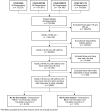Self-rated health and reasons for non-vaccination against seasonal influenza in Canadian adults with asthma
- PMID: 28207823
- PMCID: PMC5312957
- DOI: 10.1371/journal.pone.0172117
Self-rated health and reasons for non-vaccination against seasonal influenza in Canadian adults with asthma
Abstract
Introduction: While seasonal influenza vaccination is recommended for individuals with asthma, uptake in this population is low. We examined how self-rated health impacts reasons for not being immunized against influenza in Canadian adults with asthma, focusing on those who have never been immunized.
Methods: We pooled four cycles of the Canadian Community Health Survey (cycles 3.1(2005), 2007/08, 2009/10 and 2011/12), grouping individuals by whether their reasons for not having been vaccinated were perceptual or technical. We used a multivariable logistic regression model, adjusted for confounders, to quantify the relationship between self-rated health and their reported reasons for not vaccinating.
Results: Among the 9,836 respondents, 84.4% cited perceptual barriers as a reason for not being vaccinated. After adjusting for socio-demographic characteristics and province of residence, we determined that reporting perceptual barriers was associated with self-rated health status, with the adjusted odds ratios ranging from 1.42 (95%CI: 0.97, 2.09) to 2.64 (95%CI: 1.74, 3.99) for fair and excellent health versus poor health, respectively. Each increase in self-rated health category was associated with greater odds of citing a perceptual rather than technical barrier as a reason for non-vaccination.
Discussion: Self-reported health influences people's perception of the need for influenza vaccination. Viewing the results through the lens of the precaution adoption process model suggests that personalizing communication around both the risk of influenza and the effectiveness of the vaccine may improve uptake amongst adults with asthma.
Conflict of interest statement
Figures

References
-
- Webster RG, Monto AS, Braciale TJ, Lamb RA. Textbook of Influenza. Oxford (UK): John Wiley & Sons; 2014.
-
- World Health Organization. WHO | Influenza [Internet]. 25 Jan 2008 [cited 20 Apr 2016]. http://www.who.int/immunization/topics/influenza/en/
MeSH terms
Substances
LinkOut - more resources
Full Text Sources
Other Literature Sources
Medical

